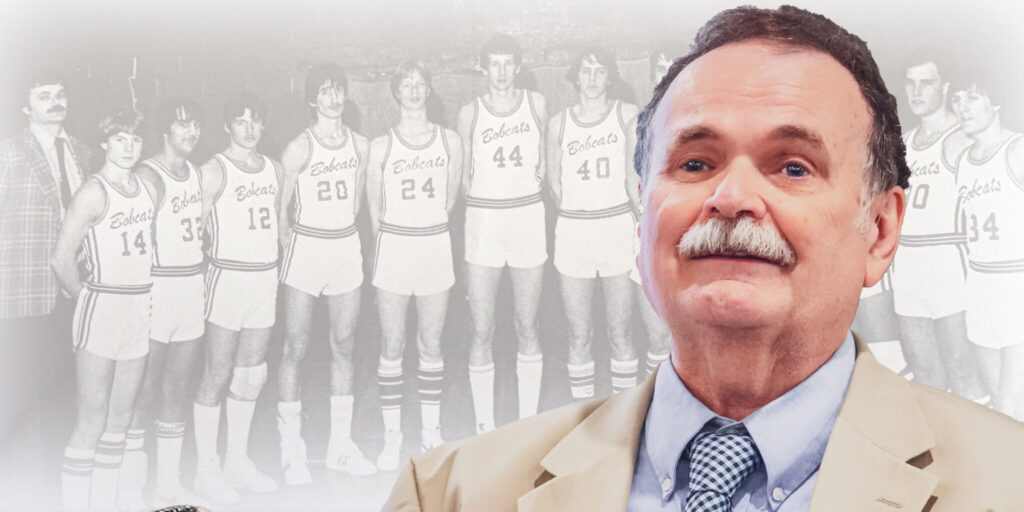By Mike Whaley
(This is the last in a series on the 2022 and 2024 inductees into the New Hampshire Basketball Coaches Organization’s Hall of Fame.)
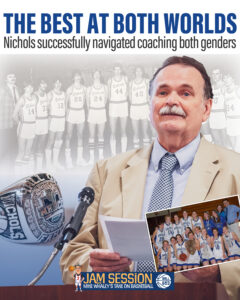 Even in his 70s, Dave Nichols’ passion for coaching basketball remains as vibrant as ever. It has never waned. When he was a young man, Dave got ahead of himself, focusing on his passion while forsaking college until he realized he needed the latter to move forward at the former. Plus, one needs to make a living.
Even in his 70s, Dave Nichols’ passion for coaching basketball remains as vibrant as ever. It has never waned. When he was a young man, Dave got ahead of himself, focusing on his passion while forsaking college until he realized he needed the latter to move forward at the former. Plus, one needs to make a living.
Dave coached multiple stints at Oyster River High School on both sides of the gender aisle for 24 years and over 40 years in total counting his time in Milford and Hanover as an assistant or sub varsity coach. He was the first, and still only, New Hampshire coach to guide both genders to a state championship – one in boys (1988) and three in girls (2003, 2006, 2009). He was an assistant coach with four other state champions. Dave was one of seven coaches inducted into the NHBCO Hall of Fame last November in Concord.
“I remember thinking, heading into Dave’s program, we were winners,” said Jill Friel, who played for the Bobcats from 2005 to 2009. “I wanted to be part of that.” She was a key member of two championship teams coached by Dave.
Hanover’s Dan O’Rourke has coached with and against Dave for over 20 years. “He had similar approaches to basketball as I had,” said O’Rourke when introducing Dave at the Hall of Fame. “It’s hard to read Dave sometimes. He has a poker face. I knew that his teams got better year by year and during the season. While we were heavily favored (in the 2005 championship game), I knew it wasn’t going to be easy, and sure enough it was tied (going) into the fourth (quarter).” Hanover pulled out a 49-38 win.
Dave was never a predictable opponent. The opposition could never be sure what he had up his sleeve coming into a season. “You always coach to the talent that you have,” he said. “That dictates whether you’re going to be a running team or a set-up team or pressing team, zone team or a man-to-man team.” Some coaches have a set style and they stick to it. Not Dave. He wanted to see what he had for talent and then adapt to the strengths of that talent. Dave predictably made the most of the players he had.
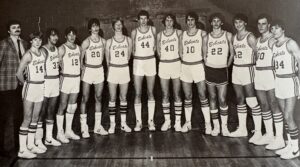
Dave grew up in Milford, played basketball for Milford High School where he graduated from in 1969. He did not take a conventional path into coaching.
After spending a year at a Kansas college, he returned to Milford and started dating a cheerleader at Milford HS, who later became his wife. He also started helping out with the basketball program. He decided not to go back to college. “I spent more time coaching basketball and arranging my schedule for basketball than I did arranging my education,” he said. “I would go to practice. I would scout. At away games, I did the scorebook.”
Dave went back to the Kansas college at the start of the 1971 school year. When he came home for the Christmas break, he noticed that Milford had a really good team. “I talked myself into not going back for the second semester,” he said. Milford was indeed good. The Spartans were a Class I school, but for just that season, they went up to Class L. They beat preseason favorite Manchester Central twice that winter – at a holiday tournament and for the Class L title. Milford won another title in 1975 in Class I.
By then Dave was on board as a freshman coach for a couple years and then the JV coach for several seasons. Still, a career path was on hold. Debbie, that cheerleader, was now his wife. They were both commuting to Fitchburg State College in Massachusetts to complete their education, graduating in 1979.
With a degree and coaching experience in hand, Dave began applying for jobs as a math teacher, while Debbie was looking to get a job as a first-grade teacher. “I was getting job interviews, but she wasn’t,” he recalled.
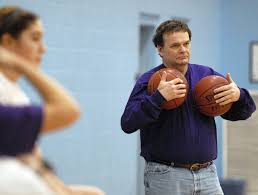
Dave interviewed in New Hampshire at Salem, Milford and Oyster River, as well as Biddeford, Maine. He had other opportunities to interview in Massachusetts and Vermont, but the feeling was they wanted to be in Maine or N.H. He decided to take the Oyster River job, which was to teach math and coach JV boys basketball. That changed pretty quickly.
It wasn’t even the first day of school when Dave was talking to Athletic Director Sam Clark in his office. In walks the current head coach, Dick Colprit, who Dave was introduced to. “He looks at me and Sam and says ‘You might as well be the varsity coach, I’m all done.’”
Dave said the main reason for Colprit’s resignation was that he felt Oyster River could not compete in Class I, which is where they were moving up to after a successful run in Class M.
Dave was taken aback. “I’m thinking there’s a 6-7 kid named Pat Galvin that I’d already met and several players that I had been told about,” he said. Clark told the principal about Colprit’s decision. He said they would sit on that for several days and think about it. A few days turned into a week, but the end result was that Dave was offered the varsity job.
Dave was hoping to be a head coach eventually, so he was ready in that regard. Had he stayed in Milford, the head job would eventually have been his. “I kind of wanted to get away from Milford,” he said. “I thought it would be good to get away for a while. I’m going to go to Oyster River for five years, which turns into 35 and then five more as a sub.”
As a first-year head coach, Dave was not intimidated at all by Class I. “That’s what I was familiar with,” he said. Dave had seen some of the kids play at a local youth center and been impressed with what he saw. “Geesh, we’ve got some players here,” he told himself. “Two years later, we’re in a championship game.”
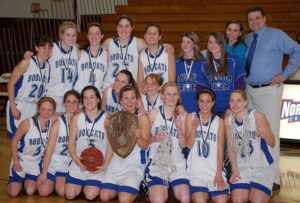
A big challenge facing Dave was that Oyster River had no feeder program. There were intramurals at the middle school level that picked all-stars at the end of the season to play several area schools. “At first, in the offseason, we scheduled something for Sunday nights and it kind of grew over the years,” he said. “Eventually we started camps and set up a whole summer schedule. That evolved. It had to be a consistent program at that level. I knew the coaches in Class I were pretty much having year-round programs and summer programs.”
Dave’s instincts were right about his early teams. His first year (1979-80), they made the Class I tournament, won a first-round game before losing in the quarterfinals to Lebanon, the eventual champion. The following year, the Bobcats made it all the way to the championship game before losing into overtime to Timberlane.
Dave had a big team with the 6-7 Galvin, two 6-4 forwards and a 6-3 guard. Their weakness was the lack of a solid point guard. Although a believer in man-to-man defense as something you always needed to have, with this team he focused on using their size and length with a 1-3-1 zone.
Timberlane coach Bucky Tardif told Dave this about that 1-3-1. “He mentioned he had to have an extra day of practice to go against Oyster River to get ready for that damn 1-3-1 defense.” Over the years, other coaches have said the same thing that they needed several days to prepare for Dave’s teams.
Matt Whaley was a 6-3 guard on Dave’s first two teams. “He did a pretty good job. He didn’t know anybody or the community,” Matt said. “It was a step up for us, for sure. He was a much harder worker (than previous coaches). He had a lot of ideas with offense. Defensively he did things.”
Matt respected Dave’s honesty. He was telling him what he needed to hear, not what he wanted to hear. “He told me I wasn’t a great ball handler. ‘You can score and rebound and do a lot of other things well.’ He was truthful.”
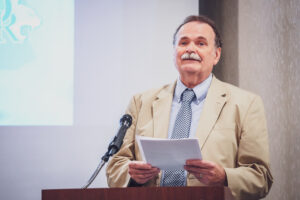
One thing Dave learned early on was that if you knew you had a good tournament team, you coached that team for the tournament all year long. “You just don’t do that the last couple days before the tournament,” he said. “You prepare them all year with your philosophy. I learned that myself.”
With his first teams, they would extend the 1-3-1 with a lot of traps and stuff. It still wasn’t ideal on a big court like the one at UNH. “But what could you do? You’ve got to coach what you have.”
After the success in ‘80-81, the program was down for a bit, operating with kids who were primarily soccer players and trying to get them to play basketball. Eventually a group led by John Freiermuth surfaced in 1985. The core was very good, but “unfortunately the expectations were higher than what the reality was,” Dave said. “You don’t win a championship with freshmen.”
But things did get better. A couple of those freshmen made varsity. The next year, Pat Casey came along, the linchpin as a point guard, even though at the time he was a “small forward.” Dave saw his potential as a point guard. Casey had good leadership qualities. He could handle the ball and pass, he could defend, he was tough, and as an added bonus, he could score. “He was determined enough,” Dave said. “We didn’t have one and I decided he was going to be one. His father was delighted. He saw the same thing I did.”
You could make the argument with little pushback that Casey was the greatest point guard to ever play for Oyster River. He scored over 1,000 points, and then went on to have a very good career at Middlebury College. “He was more concerned with defense, dishing out assists and running the game,” Dave said. But obviously he could score when needed, which added to his value at that position.
Dave said they slowly improved. They’d make the tournament and get knocked out in the first round. “The kids were fine,” Dave said. “They could see that we were progressing and getting better. We were playing a really good schedule. We got better and better every year.”
The summer before the 1988 championship, Dave coached an AAU team with Farmington’s Mike Lee and Winnacunnet’s Jack Ford. Casey and Freiermuth were on the team, which was made up mostly of players from Class L. The other Class I player was Lebanon’s Mike Joslin.
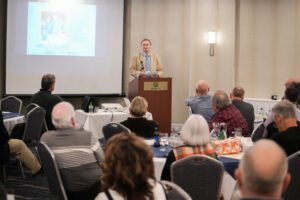
The three Class I guys hung around a lot together. Dave remembered they were playing in the AAU nationals in Arkansas. He was driving them from one gym to another. “At one point, Mike was bragging about how Lebanon was going to be state champs. Pat and John were giving it right back,” Dave said.
Finally, Dave chimed in, telling them what was going to happen. “Lebanon is going to go undefeated because they play a soft schedule,” he said. “They are going to go to the finals and when they play, hopefully us, we are going to knock them down. We’re going to play a really tough schedule like Merrimack Valley and Pembroke and Goffstown. We’ll all play each other and have 2-3 losses.” Winter comes and all that comes true. Lebanon goes undefeated. Oyster River made it past Merrimack Valley in the semis to meet Lebanon in the final.
Dave recalls that Lebanon had six limousines parked in front of UNH to take them back home after the championship to celebrate. “They can go home,” Dave offered. “I don’t know if they’re going to be celebrating.” They weren’t. The Bobcats knocked them off, 65-51.
Even winning a state title did not appease the parental naysayers of which there are usually many in Durham. “I got told ‘Well, Dave, why don’t you focus on just being the athletic director,’” Dave recalled. He was essentially being told to resign as a result of parental pressure. “I really wasn’t ready to do that. I finally got the School Board to overrule the principal and superintendent and give me back the job. Now I knew what it would be like if I actually did come back. Enough of that. I was offered the job and then I resigned.”
A common theme in some of these hall of fame stories has been when a door closes and window opens. Several years later, Dave’s daughter Kate started playing basketball. “That got me into girls basketball,” he said. “It opened up a whole new path.”
It was 1996. The current girls basketball coach had stepped down, which led to a search to fill the position. It was the fall. The search did not yield any good candidates. The recommendation was to hire Dave. The feeling was that Dave’s daughter, now a sophomore, was on the team and he had proven he can coach in the past. “They asked and I accepted,” he said. There wasn’t much basketball talent. But they were athletic with soccer and volleyball players. Dave talked a few other kids into playing. The Bobcats won four games in his first year and then five. In the third year they made the playoffs.
Since Dave was also the AD, it created a little upheaval as other administrators had to cover for him when his team was on the road. He was approached at the end of his third year coaching girls in 1999 with the suggestion that maybe it was a good idea to hire a new coach so he could totally focus on his AD duties. His second tour as a head coach was done.
Dave decided in 2000 to step down as the AD and return to teaching math full time. The AD position was half time, which meant he was also teaching math half time. “I would teach in the morning and be the AD in the afternoon and night,” he said. “It was unfair to students. It was hard to arrange extra help time.”
It worked out for Dave. He now had some free time to watch his daughter play for her college team in North Carolina. In 2001, the girls’ JV position opened up, and he was asked to take the position by the head coach. “My son was going to be a freshman,” said Dave, who talked to him about being the JV coach. He didn’t have a problem with it. “My wife smiled,” Dave said. “‘I think he has a crush on one of those girls. He’ll have an in if you’re coaching them.’” Dave took the job.
After that season, Dave said parents chased the head coach out. Dave was asked if he would take over from her. He wasn’t happy with the school letting the parents treat the coach like that so he said no. He told the coach, a young woman named Celeste Best, that he would not taek the job. She said, “I’d much rather you coach the team than have somebody from the outside come in.” Dave also saw some of the outside candidates and was not impressed. He said he’d think about it, and then he applied and interviewed. “They ended up offering me the job,” Dave said, which was for the 2002-03 season.
Dave knew right away he had a potentially very good team on his hands. He had a group of girls he had just coached as freshman (Kate Maurer, Hayley Janelle and Megan Wyand) combined with the seniors Brittney Cross and Lindsay Laughton. “This is a team that could go a long way,” he thought to himself. “Brittney and Lindsay were great leaders and really embraced those younger kids.”
The coaching changeover happened in the spring, so that allowed Dave the chance to coach the girls over the summer, which helped get ready for the season. They certainly didn’t talk about going undefeated. What they did talk about was playing 25 games, which was the maximum they could play if they played their full regular season and then went to the finals of the holiday and state tournaments. “We began chanting this thing – one down, 24 to go. Two down, 23 to go,” he said.
The moment when the Bobcats truly realized they could win the Class I championship came during the Manchester holiday tournament semifinals against preseason Class L favorite Nashua. Dave felt his team could compete with Nashua. He did not expect to win. “We ended up beating them,” he said. “We got a good lead. The last minute and a half, Brittney pretty much dribbled out the clock. They fouled her and she made some foul shots and we won.” They won the championship game as well.
When the Class I tournament rolled around, OR was undefeated and No. 1. “I mentioned the pressure of the undefeated season,” Dave said. “When we started this, the idea was to play 25. It wasn’t to win 25.”
But win 25 they did. At the end of the road was John Stark in the final at Saint Anselm College. They beat them for the title, 50-41. A 25-0 season – the program’s first title in 25 years. Nashua won the Class L championship over Alvirne, 51-48. But since Oyster River had beaten them in the holiday tournament, the Bobcats could rightly claim they were the best team in New Hampshire, and Dave was the first Granite state coach to guide both boys and girls to a state championship.
“I didn’t want the season to end,” said Cross, who scored her 1,000th career point in the championship game and then played at the next level at the University of Vermont. “We wanted to get one more win each time so we could keep it going.”
Cross never recalls feeling any pressure with being undefeated as the season progressed. “He must have done a pretty good job with that,” she said. “Obviously we were aware we hadn’t lost. We were aware of what was at stake each game. I really just remember us just enjoying competing together and finding a way to win.”
Cross felt that Dave “had a lot of confidence and belief in us. I can remember that as an individual. I was kind of an undersized point guard. I wasn’t really getting recruited. I was probably lacking a little of the confidence I needed to get to the next level or to lead the team in the way I was capable of. Coach Nichols did a great job of instilling confidence and belief and expectation in me personally, and then as a result in the team that we could do it, to compete for a state title.”
Two years later with that strong group of sophomores now seniors – Janelle, Maurer and Wyand – the Bobcats lost in the championship to Hanover. They came back with a new team in 2005-06, lost one game in a holiday tournament, and went on to win the state title over Kearsarge, 45-33.
Jill Friel was a freshman on that team as the sixth man. She was the youngest of former University of New Hampshire men’s basketball coach Gerry Friel’s five basketball children. All played for Oyster River. All scored 1,000 points, and all went on to play Division I college basketball (Jill at UNH). She said she was fortunate to have some great seniors to look up to in Nicole Casimrio, Chelsea Evans and Sam Brown, as well as juniors Kelsey Cross and Emily Jasinski. “They all taught me the ropes,” she said.
Friel was particularly appreciative of how Dave handled her. “He treated me as an individual,” she said. “He acknowledged and was aware that my family had a reputation; that I would have eyes on me. He acknowledged that. But he treated me as an individual. What do I want to get out of being on the team? What did I want to get out of myself? Our relationship was about our team and how I would contribute to that team. It wasn’t about my family’s legacy or comparing or contrasting my siblings. He navigated that well.”
Fast forward to the 2008-09 season. Friel was now a senior. She was the centerpiece on the Bobcats along with sophomore center Danielle Walczak. In an early battle between top teams, Oyster River was hammered at home by defending champion Hanover, 71-39. After the game, Dave told the team, “I still have a lot of faith in you guys, but obviously we have a lot of things to get better at and things to work on. This is good that we can use this the rest of the season as motivation.”
Hanover coach Dan O’Rourke, who introduced Dave at the Hall of Fame ceremony, remembered that game. “When I went through the line to shake Dave’s hand, there was that face, a look of determination.” O’Rourke recalled the rest of the season, checking the NHIAA standings and seeing that Oyster River was winning and winning and winning. The Bobcats never lost another game.
Meanwhile, Friel recalls that early-season loss. “That was really the touchstone of the year,” she said. “The snapshot of it was if you want to be the best, you have to beat the best. We lost by 30. We got absolutely demolished. We knew how far we had to go. On the other hand, we knew we had strong centerpieces in myself and Danielle Walczak. It was also about how do we get the rest of the pieces to fit.”
One thing Dave did that Friel thought worked well with the team was to move the Hanover game into the rearview mirror and focus on being the best team in the Seacoast area, which had some very good teams in Portsmouth, St. Thomas Aquinas and Coe-Brown. “If we can dominate the Seacoast, we’re in a really good position; we’re demonstrating that we’re getting better and we at least have the capability to excel. It was mentally breaking it down into smaller goals. If we were making sure that we won our neighborhood that would progress us to eventually take down Hanover.”
When the dust settled on the Class I season, Oyster River and Hanover were the last two left standing in the championship game at Southern New Hampshire University. Hanover had everyone back from the previous year’s championship team, but there was a lot of fighting amongst themselves. They had several very good big players and an outstanding guard, although Dave felt Walczak was the best big player in the tournament, despite being only a sophomore. Friel, of course, was a top-notch guard.
“Sure enough, we met in the final,” said O’Routke. “Again we held them to 39 points, which was great. In my career, we only lost two or three times when we held a team under 40 points. That was always my goal (to hold the opposition under 40).
“Unfortunately, Dave’s team came out and played one of their best games. It was a defensive battle and they held us to 33 points and he won (39-33).”
A key part of the game was indeed defense. While Friel was held to four points (but also seven assists), she held Hanover star guard Lizzie BelBruno scoreless. Walczak had a monster game with a game-high 15 points and 11 rebounds.
“Everybody else stepped up. That was the biggest difference between losing by 30 early in the year versus so many different parts of the team we could lean on in those moments if they’re going to shut myself down,” said Friel.
Dave recalls at halftime the Bobcats were up 22-15. Friel was shooting around at halftime while Dave sat on the bench. Her brothers, Keith and Greg, called her over to offer advice. When she came back to the bench, he asked her what they talked about. She said they told her she needed to score if they were going to win. Dave looked up at the scoreboard, which showed a seven-point lead despite Friel not scoring. “I think we’re going pretty good,” he said. Friel shook her head up and down. “I think so, too,” she replied.
Hanover got as close as two points at 4:59 of the fourth quarter (26-24) before Friel fed a lob to Walczak for two points and the Bobcats were on their way to the win.
Friel said it helped that Dave trusted her, especially as she got older and became a captain. That was important. The idea that this was a collaborative effort. “He allowed me opportunities to be a leader without his voice and with his voice,” she said. “I’m really appreciative of that. I also feel that the most important thing he did was make me and all of us feel like we controlled our own destiny. Whether that’s how we lead or that’s how we play, we had a say in those things in how that looks.”
Friel paused for a second, adding, “It comes down to him recognizing us as individuals and allowing that room. I think he had a preferred method of how he wanted us to play. But ultimately he was really flexible in leading the team to what we were capable of.”
Dave coached through the 2012-13 season, although with far less talent at point guard, the Bobcats never achieved the success of those teams in the 2000s. He also saw the writing on the wall. Some administrators weren’t happy with him, so he decided not to fight it and moved on. That opened the door to new opportunities as a scout and an assistant coach.
Two friends and opposing coaches, O’Rourke and Ed Tenney (Sunapee), asked him to scout for them during the 2013-14 season in the Seacoast area. So he went to Class I girls games for O’Rourke and Class S boys games for Tenney, who was now a boys coach after battling Dave as a Class I girls coach at Kearsarge.
That scouting evolved into an assistant coaching position at Hanover. Halfway through the Class I season, Dave said to O’Rourke, “I’ve done so much scouting and telling you how to beat these teams, but I don’t know your team very well.” O’Rourke invited Dave to come up and spend the night in Hanover. He went to a couple of practices and then a couple of games. Dave would sit in the bleachers and write up reports.
Eventually Dave was invited to sit on the bench with the team as a full fledged assistant in 2015. When he wasn’t scouting, he was at the games on the bench. “They had some really good teams,” said Dave, who has been involved with the Hanover team in some fashion for 12 seasons, including championships in 2019 and 2022 – 50 years after he was part of his first state title at Milford in 1972. “I would scout the toughest opponents and would show up (for those tough games).”
During the 2021-22 season, Dave scouted Bow seven times, Hanover’s eventual championship opponent. “I knew what they were going to do before they did it,” he said. “I knew them so well.”
There was a reason Dan O’Rourke wanted Dave as part of his Hanover staff. “Dave has found success wherever he’s coached. Most importantly, he’s done it the right way. He’s a man of integrity, high moral character. He’s done it with commitment, respect and he’s created the culture.” Like Jill Friel said when she came in as a freshman, his program was something you wanted to be part of because it was a winning program.
Looking back, Dave said as a head coach “I always felt kids needed to have fun. A lot of kids are getting pressured to focus year round on soccer, volleyball or whatever it is. I never wanted kids to focus year round on basketball. But I wanted them to play as much as they could. I always offered opportunities. I helped kids get on AAU teams. I talked to the coaches. I prepped them for tryouts.”
He ran local summer leagues, summer camps and held open gyms. That was something that struck Jill Friel. “Dave’s differential is that he always shows up,” she said. “He was always willing to put in the extra time. Summer leagues. Summer camps. That’s him volunteering for us to have the best possible experience. I find that even more remarkable as an adult that he continued to show up and invest in others.” The simple act of caring and then acting on it was a big part of who Dave Nichols was as a coach. He could see a player or group of players for who they were, adapt to their strengths and then mold them into a successful team that was having fun, while always making sure there were opportunties available to improve. That was a true hallmark of his coaching.
Mike Whaley can be reached at whaleym25@gmail.com


